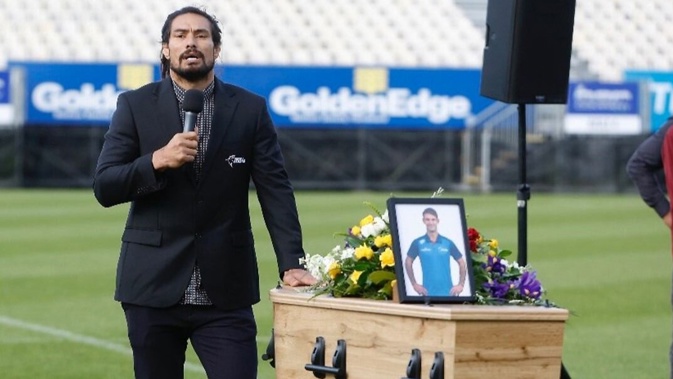
Former Māori All Black Shane Christie died suddenly in Nelson this morning, sparking calls from grieving friends for greater attention on the damage a rugby playing career can cause.
Friends of Christie told the Herald it was believed his death was self-inflicted and came after a period during which concern over his wellbeing had increased.
Christie was an advocate for greater focus on the damage repeated head injuries can have – particularly the links with Chronic Traumatic Encephalopathy (CTE).
CTE is a degenerative brain disease that can only be diagnosed after death. The symptoms include aggression, depression, memory loss and paranoia.
Christie had told the Herald he wanted his brain to be studied after his death to see if he had CTE.
In New Zealand, Christie’s close friend and teammate Billy Guyton was found to have CTE in a brain study carried out after his death in a suspected suicide.
In the United States, it has been linked to multiple suicides among professional football players.
The posthumous diagnosis of Guyton made him the first professional New Zealand-based rugby player confirmed to have the disease.
Guyton retired aged 28 due to ongoing concussion symptoms and died in 2023 at age 33.
Christie’s lawyer, Craig Morice of Nelson, told the Herald the former player was not only a client but a friend.
“I’m absolutely devastated that something like this has happened,” Morice said.
“The time for discussions about preventing this happening again is not now but that is a discussion that needs to take place and should take place.
“We shouldn’t run from this discussion. I’m so incredibly sad for Shane’s family and friends and team mates he has left behind.”
Christie captained Tasman to an NPC title and co-captained the Highlanders to their maiden Super Rugby title in 2015. He also represented the Māori All Blacks but had his career cut short in 2018 because of ongoing and severe concussion symptoms.
In December, Christie told the Herald of wanting to donate his brain to medical science so it could be studied for the damage his playing career caused – and changes he would make to rugby to make it safer for the next generation.
The police said officers were sent to “a sudden death in Nelson this morning” after receiving an alert just after 8.20am.
“The death will be referred to the coroner and we have no further information or comment we can provide.”
Former NZ Herald journalist Dylan Cleaver, whose ground-breaking journalism reported extensive links between rugby and head injuries leading to CTE, said it was “more evidence that we need to take this subject seriously”.
“It is more evidence we need to acknowledge the link between head knocks and not just neuro-degenerative disease but mental health outcomes.
“This is tragic news. It is heart-breaking. It is just so important we keep having conversations about head injuries in rugby.”
Former NZSAS operator Gregg Johnson met Christie through their shared experience of repeated head knocks in their professional careers - and their efforts to have their former employers shoulder the burden of care and treatment of those who succeeded them.
On this week last year, the pair were together at the Centre for Brain Research in Auckland attending a seminar on CTE.
Johnson told the Herald he was saddened to hear of Christie’s death.
“Our stories were identical. If we told our story without saying what we were, people wouldn’t know which was which.”
More to come ...
SUICIDE AND DEPRESSION
Where to get help:
• Lifeline: Call 0800 543 354 or text 4357 (HELP) (available 24/7)
• Suicide Crisis Helpline: Call 0508 828 865 (0508 TAUTOKO) (available 24/7)
• Youth services: (06) 3555 906
• Youthline: Call 0800 376 633 or text 234
• What's Up: Call 0800 942 8787 (11am to 11pm) or webchat (11am to 10.30pm)
• Depression helpline: Call 0800 111 757 or text 4202 (available 24/7)
• Helpline: Need to talk? Call or text 1737
• Aoake te Rā (Bereaved by Suicide Service): Call or text 1737
If it is an emergency and you feel like you or someone else is at risk, call 111
David Fisher is a senior journalist for the New Zealand Herald who has twice been named New Zealand’s Reporter of the Year. He is based in Northland and has worked as a journalist for more than 30 years, winning multiple journalism awards and being selected as one of a small number of Wolfson Press Fellows to Wolfson College, Cambridge. He joined the Herald in 2004.
Take your Radio, Podcasts and Music with you









